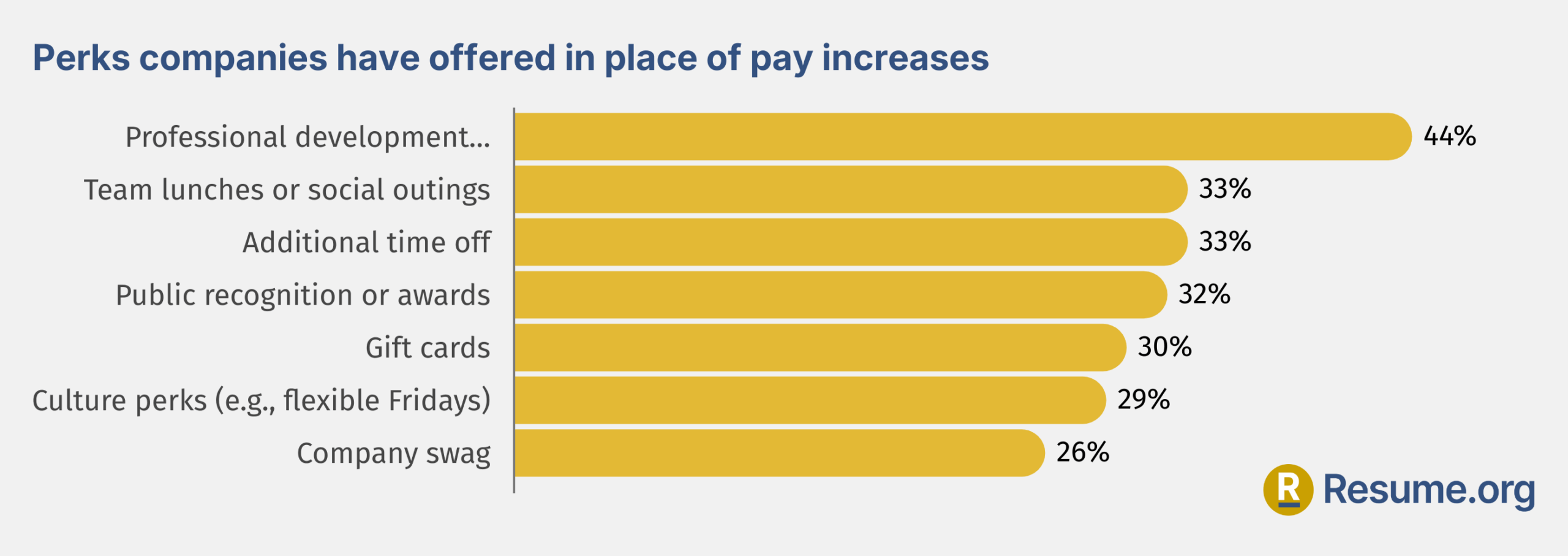Resume.org surveyed 1,000 business leaders to learn how companies are approaching raises in 2025.
Most companies say they’ve issued or will issue raises this year, but few are granting them across the board. Many are limiting raises to select employees, citing economic uncertainty, tighter budgets, and a cooling labor market that has reduced turnover pressure.
Takeaways:
- Half of companies say 50% or fewer workers will get a raise in 2025
- Only 15% of companies will give raises to all employees
- 68% cite economic uncertainty for withholding raises
- 23% of companies promoted employees without a pay bump
- Nearly half of companies expect layoffs in 2026
Most Companies Are Giving Raises, But Not to Everyone
Nearly all employers (95%) have issued or plan to issue raises in 2025, but few are distributing them companywide. Only 15% of companies will give every worker a raise, and about half say only 50% or fewer employees will see an increase this year.
Performance-based raises are most common (79%), followed by cost-of-living (63%) and promotion-based (54%). Among companies issuing cost-of-living adjustments, 3% is the most typical increase (41%), while 15% will only give 2%.
1 in 4 Companies Promoted Employees Without a Pay Bump
Nearly one in four companies (23%) say that at least some promoted employees did not receive a raise, despite receiving a title change.
Many companies are offsetting the lack of pay increases by offering other forms of recognition and retention incentives. About 44% have offered professional development or training in place of pay increases, 33% provide team lunches or outings, 33% grant extra time off, and 30% give gift cards. Another 26% offer company swag, and 29% tout culture perks like flexible Fridays.
“When perks like remote work, team lunches, or gift cards are used instead of raises, employees often perceive them as a short-term gesture rather than a genuine investment in their value. In today’s job market, flexibility and remote work are among the most sought-after benefits, but they’ve become an expectation, not a substitute for fair compensation,” says Dennison.

Employers Say Economic Uncertainty Is Limiting Pay
About 27% of companies giving raises admit they’re smaller than what was given in previous years.
Among employers giving smaller or no raises this year, 68% blame economic uncertainty, 53% cite cost-cutting measures, and 28% say the labor market favors employers, allowing them to hold pay steady without losing staff.
“When companies fail to offer raises, even modest cost-of-living adjustments, morale inevitably declines. Employees begin to feel undervalued and disconnected from leadership, particularly when their workload and performance expectations remain unchanged,” says Kara Dennison, head of career advising at Resume.org.
“High performers, in particular, interpret the absence of raises as a signal to explore organizations that align compensation with contribution. Strong leaders can mitigate this by acknowledging financial constraints while reinforcing their commitment to employee growth and recognition. When raises aren’t possible, opportunities for skill development, internal mobility, and genuine appreciation become essential to sustaining morale and retaining top talent.”

Financial Constraints Will Continue Into 2026
Looking ahead, 78% of employers plan to issue raises in 2026, primarily performance-based (79%), cost-of-living (62%), or promotion-based (55%). However, most say pay increases will remain selective rather than across the board, suggesting tight budgets will persist into next year.
In fact, many companies anticipate taking additional cost-cutting measures, including layoffs. Twenty-one percent say they will definitely lay off employees, while 27% will probably lay off employees in 2026.
“With companies signaling potential layoffs ahead, employees are becoming more cautious, anxious, and in some cases, disengaged. Employees should focus on building skills that strengthen their market value, documenting their impact, and maintaining strong professional branding and networks inside and outside the organization. Motivation doesn’t mean blind loyalty; it means taking ownership of your career trajectory, regardless of company uncertainty,” says Dennison.
Resume.org commissioned this survey, which was conducted via Pollfish in October 2025. A total of 1,000 U.S. business leaders participated. To qualify, respondents had to meet strict demographic criteria, including education (college or higher), income ($75,000+), age (30+), and full-time employment.
Resume.org offers free, HR approved resume templates to help you create a professional resume in minutes. Choose from several template options and even pre-populate a resume from your profile.